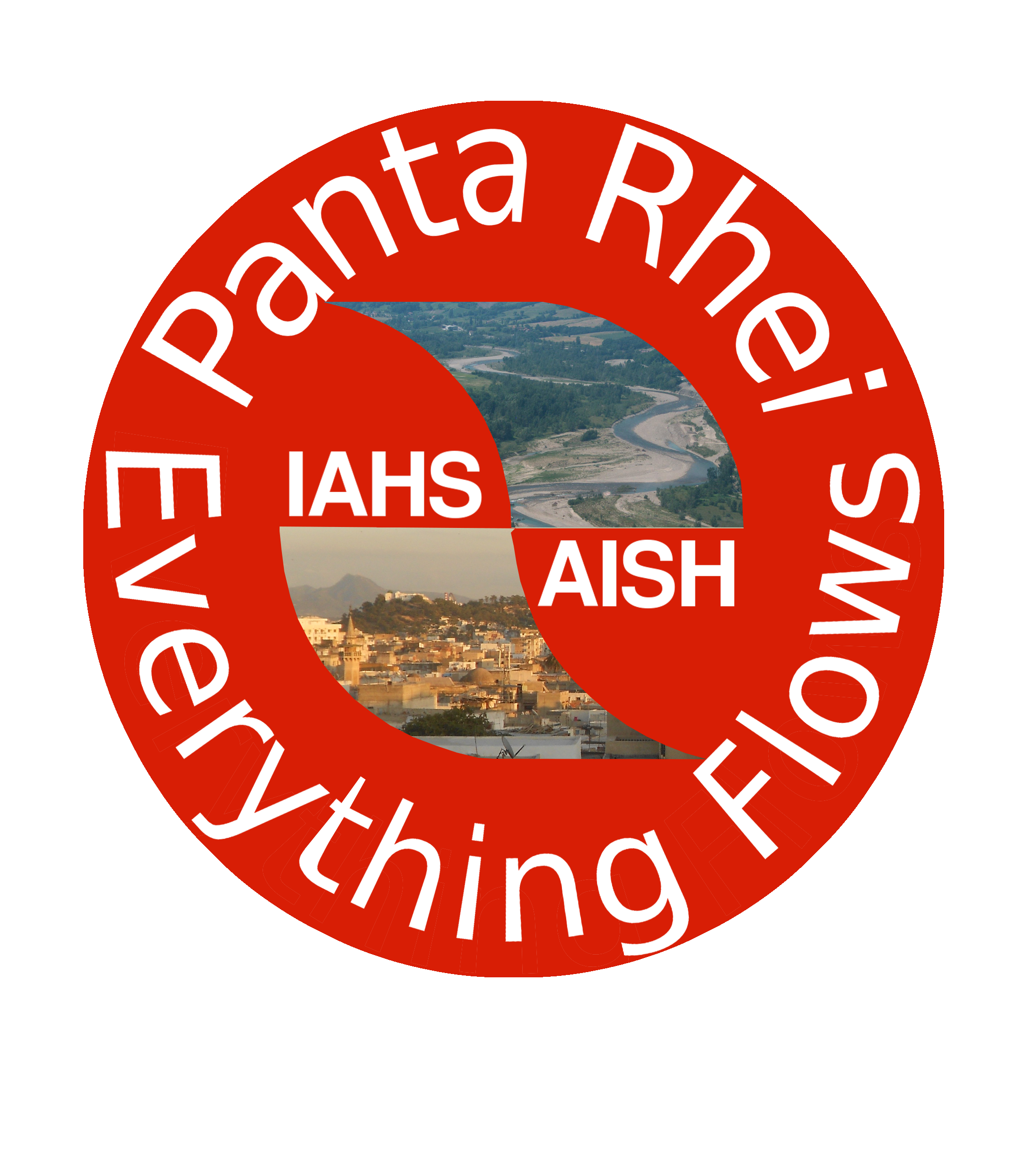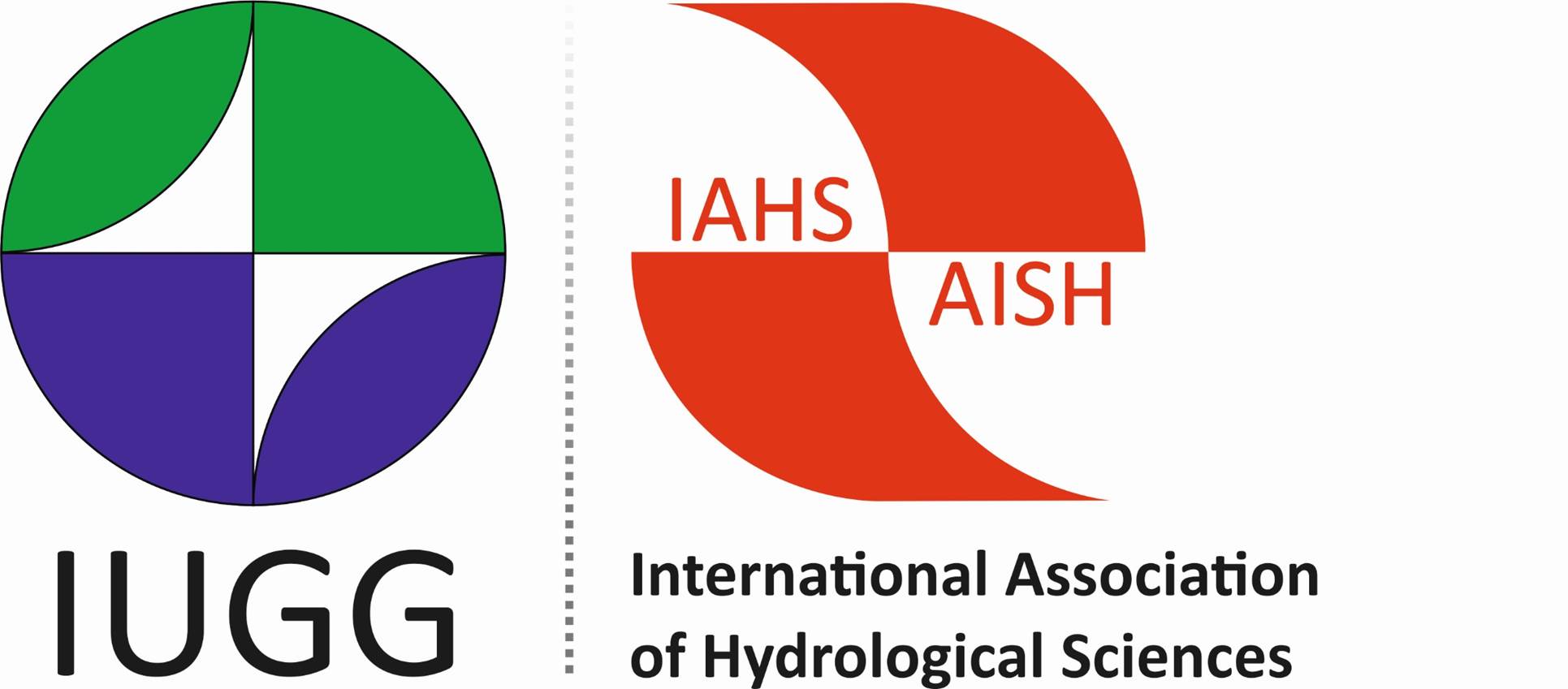
Program
Monday
13:00-13:20 Welcome speeches by Berit Arheimer (IAHS President) and Heidi Kreibich (Panta Rhei chair)
13:20-14:05 Keynote Johan Rockström: Water as a common good
14:05-14:50 Keynote Fuqiang Tian: Panta Rhei synthesis - Keys to Understand and Manage Coupled Human-Water System
14:50-15:30 Coffee break
15:30-15:45 Marc Muller and Maria Rusca: Theoretical frameworks for coupled human-water systems
15:45-16:00 Giuliano Di Baldasarre and Yongping Wei: System thinking: Phenomena and archetypes
16:00-16:15 Saket Pande and Anna Scolobig: Methods for studying changes in hydrology and society
16:15-16:30 Alberto Viglione and Jenia Mukherjee: Human-water systems - the example of flooding
16:30-17:15 Panel discussion “How to implement Panta Rhei results in practice” (Panelists: Britta Höllermann, Jean-Marie Kileshye Onema, Ana Mijic, Taikan Oki, Anne Van Loon; Moderator: Josef Zens)
17:15-17:55 Flashlight talks (8 talks a 5 mins) with following discussions at the posters
- Tobias Krueger: Developments in transdisciplinary water research during the Panta Rhei scientific decade
- Paul Wagner: Addressing dynamics in human-water systems with a tightly coupled modeling approach: Experiences from the Western Ghats, India
- Sarra Kchouk: Drought-impacted communities in social-ecological systems: exploration of different system states in Northeast Brazil
- Samuel Sutanto: Characteristics of future compound drought and heatwave in Europe
- Riccardo Biella: Need for systemic European-wide drought management: A holistic overview of the 2022 European drought
- Doris Wendt: A bottom-up approach to drought resilience
- Philip Ward: The need to integrate disaster risk reduction strategies
17:55-18:45 Poster session
- Jan Sodoge: Pooling complex socio-economic drought impact patterns from participatory modeling
- Anne Van Loon: Drought legacies from different perspectives
- Yanchen Zheng: Assessing the impacts of human-water interactions on hydrological drought using a coupled surface-subsurface model
- Mourad Guesri: Assessing the impact of temporal resolution on estimates of rainfall erosivity in semi-arid region
- Tais Maria Nunes Carvalho:Unveiling Water Allocation Dynamics: A Text Analysis of 25 Years of Stakeholder Meetings
- Alvar Escriva- Bourte: Developing Drought Indicators for Assessing Multi-Sectoral Impacts in Complex Water Systems
19:00 Dinner: barbecue at the venue
Tuesday 9:00 – 17:00
9:00-9:45 Keynote Manuela Brunner: Climate and reservoir influences on droughts, floods, and their transitions
9:45-10:35 Flashlight talks (10 talks a 5 mins) with following discussions at the posters
- Sina Khatami: System archetypes for characterizing the dynamics and co-evolution of human-water systems
- María Carmen Llasat: Characterization of compound flood events in the Mediterranean Spanish Coast in basis to their remarkability
- Li Han: Hourly hydrological simulation of historical and future flood events in Western Germany
- Elena Macdonald: Heavy tails of flood peak distribution – controls along the flood process cascade
- Mariana Madruga de Brito: Assessing flood socioeconomic impacts through text-mining
- Daniela Rodriguez Castro: How does the local context influence flood impacts?
- Dominik Paprotny: Trends in flood impacts in Europe, 1870-2020: preliminary results from HANZE v2 database
- Britta Höllermann: To Adapt or Mal-Adapt? Taking a collaborative lens to look beyond the human-flood system for sustainable and resilient flood risk management in Ghana
- Shinichiro Nakamura: The Emergence of Lost Rivers in Tokyo: An Urban Socio-Hydrological Phenomenon and Processes
- Franziska Frankenfeld and Rasmus Rehwaldon behalf of the 2023 Social Hydrological class at Humboldt-Universität: Human-water relations along the Panke River in Berlin-Brandenburg
10:35-11:15 Poster session
- Rui Guo: Nine centuries streamflow reconstruction for the Po River
- Laura Devitt: Global sensitivity of inundation extent and population exposure to flood magnitude
- Kasra Rafiezadeh: The Potential of Machine Learning Approaches in Flood Loss Modeling: A Case Study of Ho Chi Minh City, Vietnam
- Sergiy Vorogushyn: Dike systems shape spatial pattern of flood heavy tails – insights from continuous process-based simulations with Regional Flood Model (RFM)
- Eduardo Mario Mendiondo: Societal-hydrological interactions of multi-purpose freshwater reservoirs under global changes coevolutionary scenarios
- Saskia Salwey: Developing generic reservoir operating rules for inclusion in the national-scale hydrological modelling of Great Britain
- Chamal Perera: Policy assessment of the hard-path vs. the soft-path using a socio-hydrological model: A case study from Kelani River Basin, Sri Lanka
11:15-11:45 Coffee break
11:45 -12:30 Keynote Joerg Niewoehner: Situating Modelling. Understanding water through integration and agonism
12:30-13:15 Flashlight talks (9 talks a 5 mins) with following discussions at the posters
- Ilaria Delfini: Sustainable management of groundwater resources under climate change in the Emilia-Romagna region in Italy
- Gerald Norbert Silva da Souza: Hydro-economic spatial decision support for water allocation using water use and productivity indicators
- Takeo Yoshida: Comparison of evolutionary pathways of water-rice coupled systems over the past 70 years in two contrasting watersheds in Japan
- Eduardo Mario Mendiondo: Grey Water Footprint of Rapidly-Urbanized Tropical Areas Worsened by the Coevolutionary Amazon-Sanitation Paradox
- Abror Gafurov: Improved understanding of hydrological change in Central Asia and its implications to society
- Karen Lebek: Why rainwater is harvested in different ways and what this means for household water insecurity – findings from a mixed-methods study in rural South Africa
- Rodrigo Maia: Challenges on EU Transboundary Water Resources Management. The Iberian Peninsula case
- Jörg Lewandowski: Trace organic compounds in River Erpe – The most important findings from 12 years of research
13:15-14.15 Lunch
14:15-15:00 Poster session
- Afeina Bleza: Isotope investigation on groundwater recharge and dynamics in aquifers of savannah region in northern Togo
- Bhargabnanda Dass: Hydrological Process Understanding in data-scarce Indian Himalayas: An Account of Field Experiments for Sustainable Watershed Management
- Ayano Hirbo Gelebo: Assessment of spatio-temporal variation of surface water balance components in data-scarce in tropical large-scaled river basin
- Romitha Wickramasinghe: Bulk water allocation policy in Mahaweli H region Sri Lanka; Lock in of a water management policy due to prevailing cultural norms
- Valeriya Ovcharuk ,Maryna Goptsiy , Bohdan Zakatey,: Seasonal distribution of river flow in the Lower Dnieper subbasin
15:00 – 15:30 Coffee break
15:30-16:30 Panel discussion on remaining gaps and future research (Panelists: Mariana de Brito, Pedro Chaffe, Alberto Montanari, Valeriya Ovcharuk, Archana Sarkar; Moderator Christophe Cudennec)
16:30-17:00 Günter Blöschl: Panta Rhei: Lessons learned and ways forward


